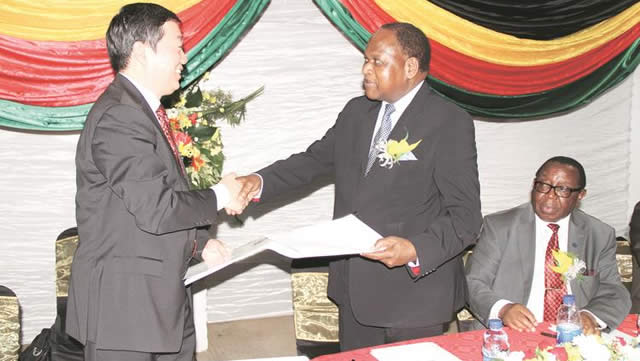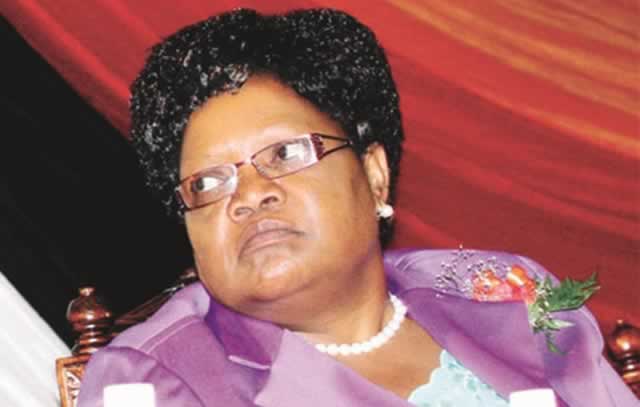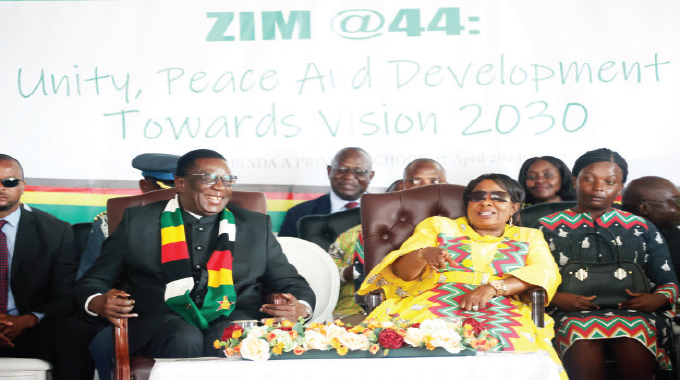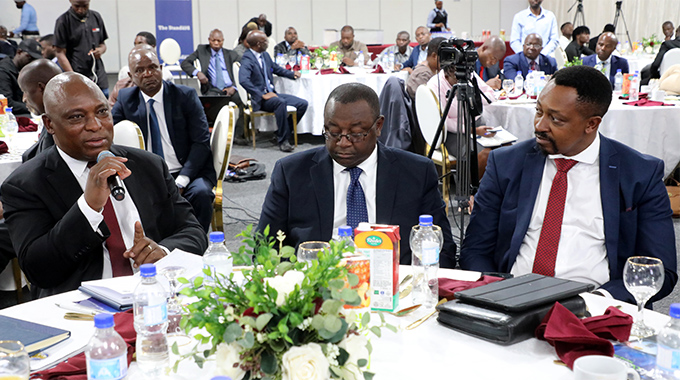Zim, China pen landmark deal


Chief Secretary to the President and Cabinet Dr Misheck Sibanda congratulates Chinese head of delegation Dr Cao Wenlian after signing a Memorandum of Understanding at Pakare Paye Arts Centre in Norton yesterday, while Economic Planning and Development Minister Simon Khaya Moyo looks on. — (Picture by Innocent Makawa)
Tendai Mugabe Senior Reporter—
ZIMBABWE and China yesterday signed another landmark Memorandum of Understanding that will assist Government fully implement key elements of the economic blueprint, Zim-Asset. This follows several investment deals signed between Zimbabwe and China during President Mugabe’s state visit to China last August.
The MoU, which will cover key sectors of the economy, was signed at Pakare Paye Arts Centre in Norton after four days of intensive exchanges between senior Government officials led by the Chief Secretary to the President and Cabinet Dr Misheck Sibanda and members of the National Development and Reform Commission of China.
Dr Sibanda — representing the Office of the President and Cabinet — signed the MoU, while Dr Cao Wenlian, who stood in for the National Development and Reform Commission of China, represented the Chinese.
Key areas covered by the MoU are reform and reorganisation of State enterprises, design, establishment and administration of Special Economic Zones and planning and administration of Small to Medium Enterprises.
Other key components of the agreement cover promotion of strategic economic policy planning and research, enhancing capacity to drive national economic reform programmes and establishing a platform for co-operation in investment and communication.
Speaking on the sidelines of the signing ceremony, Dr Sibanda said through Zim-Asset, Zimbabwe was already on the path of implementing key tenets of the MoU.
“Regarding the restructuring of State-owned enterprises, it is noted that we are on the correct path.
“However, there is need to accelerate the reform process and draw some lessons from our Chinese friends, for example the listing of successful enterprises on the stock exchanges locally and abroad.
“We will also need to expedite the implementation of good corporate governance in order to improve accountability and service delivery.”
He said as Government, they had learnt a lot from the Chinese experiences of the last 65 years including the need to put in place monitoring mechanisms through performance-based contracts for key personnel.
Dr Sibanda said Government resolved to up the tempo regarding the setting up of Special Economic Zones.
He said there was need to create a favourable investment environment that attracted investors.
“There is need to address the ease of doing business through the establishment of a functional one-stop shop facility and the urgent improvement of national competitiveness index,” he said.
“There is also need to move with speed in the formulation of a more comprehensive transport policy for co-operation in industry and investment, we are ad idem (in agreement) that the China-Zimbabwe investment and industry co-operation should be underpinned by promotion of exports and inflow of foreign direct investment, for example through lines of credit.”
Dr Sibanda said the Chinese agreed to pursue the idea of selective strategic attachments of Zimbabwean professionals to the various departments of the NRDC on a short-term basis to promote development and skills transfer in identified key areas.
Speaking through an interpreter, Dr Cao commended the blossoming relationship between Harare and Beijing.
He said good policies and proper planning were the gateway to prosperity.
“In the past four day we have deepened the understanding between the two countries sharing our problems and opportunities. Good policies must be born from the real situation of your own country.”
Dr Cao explained the role the ruling party should play in national development and the importance of major projects as key drivers of the national economy.
To ensure maximum economic benefits, Dr Cao said it was important for Government to establish a positive relationship with the market.
Economic Planning Minister Cde Simon Khaya Moyo, said the MoU would help to accelerate the implementation of Zim-Asset.
“It is our expectation that the NRDC will assist us in translating the strategies outlined in Zim-Asset into implementable and results oriented short to medium term programmes and projects.”
Zimbabwe’s former ambassador to China and Minister of Welfare Services, War Veterans, War Collaborators, Former Political Detainees and Restrictees Minister Cde Chris Mutsvangwa, said Zimbabwe was privileged to be visited by the NRDC as it only dealt with countries such as the United States of America and the developed world.
He said Zimbabwe was the first developing country to be visited by the NRDC and it confirmed the strong bilateral relationship that existed between Zimbabwe and China.
The signing of the MoU was witnessed by several senior officials from the President’s Office and Zimbabwe’s ambassadors to various diplomatic missions.
The Chinese delegation had an opportunity to visit the High Computer Performance Centre at the University of Zimbabwe, Gwebi Agricultural and Technology Demonstration Centre and the Afrochine Smelting in Selous.
Afrochine is subsidiary of stainless steel giant processor Tsingshan.










Comments